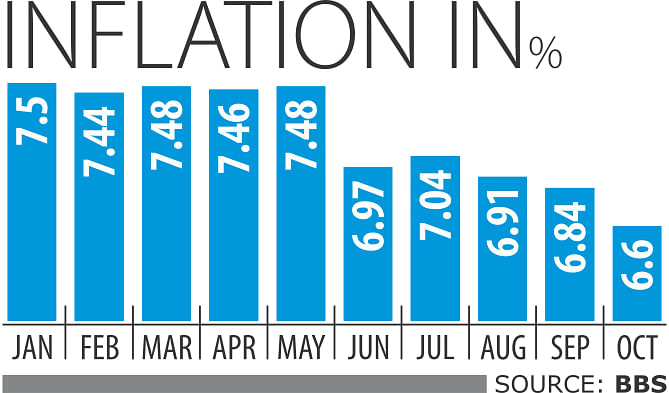Inflation the lowest since Dec 2012
Inflation the lowest since Dec 2012

Inflation continued its descent in October, coming down to 6.6 percent, the lowest in 23 months, much to the cheer of central bankers.
Food inflation was the biggest driver behind the drop last month, sliding to 7.16 percent from 7.63 percent in September.
Non-food inflation, however, edged up to 5.74 percent last month from 5.63 percent in September, owing to a rise in house rent, transportation costs, education and medical expenses and other non-food items, the Bangladesh Bureau of Statistics said yesterday.
The sustained fall in food prices in the international market also helped matters.
Edible oil prices decreased 19 percent in the international market in the last six months, while the prices of petroleum products went down by $18 dollar per barrel in recent months, Planning Minister AHM Mustafa Kamal told reporters at the unveiling of the inflation data.
BBS Director General Golam Mostafa Kamal said prices of 16 items, which the country imports, declined substantially in recent months at the international level.
Non-food inflation went up in October as two major religious festivals took place at the beginning of the month. “People's movement and consumption of non-food items increased ahead of the festival,” he said.
Given the downward trend, both the minister and the BBS chief said they are hopeful of hitting the inflation target this fiscal year.
With the latest reduction, inflation is close to Bangladesh Bank's target for the fiscal year -- 6.5 percent.
Inflation declined in both the urban and rural areas last month. In rural areas, it dropped from 6.75 percent in September to 6.49 percent, and in urban areas from 7.02 percent to 6.79 percent.
It came as world food prices tracked by the United Nations fell for the seventh month in October, the longest slide since 2009, as the cost of dairy and meat fell amid outlooks for rising production.
An index of 55 food items fell 0.2 percent month-on-month to 192.3 points, the lowest since August 2010, the UN's Rome-based Food and Agriculture Organisation wrote in an online report. The index is stabilising, it added.
The recent recovery in activity aided by stability, the revival of income growth in services and slight moderation in remittance decline, all contributed to temporary increase in non-food inflation, the World Bank's local unit said last month.
The multilateral lender, however, said higher wages and administered policy adjustments pose upside risk to inflation.
The WB also said achieving the current fiscal year's target on inflation will depend on international price trends as well as domestic demand and supply conditions.
Internationally, despite favourable prospects for cereal supplies, several uncertainties are hanging over the near future, exerting upward pressures on prices, such as weather in the US and possible escalation of geopolitical tensions in the Arab world or Ukraine.
“What will matter most for Bangladesh are domestic supply-demand conditions and macroeconomic management,” said the World Bank.
In a meeting of the government's Fiscal Coordination Council on Wednesday, chaired by Finance Minister AMA Muhith, the issue of inflation was also discussed. The council also hoped that the inflation target would be achieved.
The continuity in supply-side following disruptions last year due to political turmoil, the high production of rice and the supportive monetary policy, have contributed to the fall in inflation, the council said.